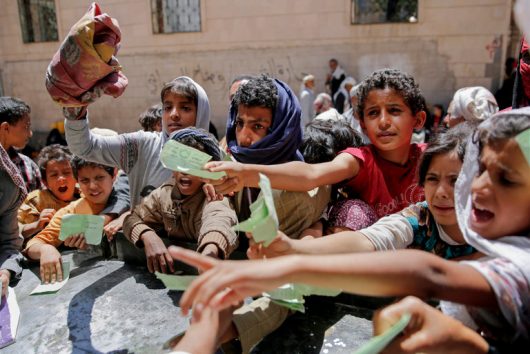Alleviating the Humanitarian Crisis in Yemen
 There is currently a devastating humanitarian crisis in Yemen. Many factors are intensifying the suffering being experienced by the Arab world’s poorest nation. The civil war is going on its third year and created conditions for famine, disease and terrorism to flourish. A variety of people and organizations are helping Yemenis in need, yet, it will be a long path to stability.
There is currently a devastating humanitarian crisis in Yemen. Many factors are intensifying the suffering being experienced by the Arab world’s poorest nation. The civil war is going on its third year and created conditions for famine, disease and terrorism to flourish. A variety of people and organizations are helping Yemenis in need, yet, it will be a long path to stability.
In September 2014, a group of Yemeni rebels, supported by Iran, overthrew Yemen’s government. In March 2015, Saudi Arabia supplied military forces to reinstate the government, with help from the U.S. The country remains in a civil war.
At least 10,000 people were killed, and two million people were displaced as a result of the war. Those evading conflict are who suffer most. The civil war led to famine, the collapse of Yemen’s healthcare system and a cholera outbreak.
Currently, almost half of Yemenis are food-insecure. Almost 2.2 million children are malnourished, 462,000 of whom have severe acute malnutrition. Furthermore, the cholera outbreak which impacted more than 300,000 people.
The civil war made these issues worse because it caused the healthcare system in Yemen to collapse. Poverty also exacerbates the crisis. Many Yemenis lost all their wealth because of the conflict. They are forced to work more and cannot take time off to stay with sick family in the hospital, nor can they necessarily afford travel expenses and treatment. Furthermore, the malnourishment experienced by a generation of children may set the stage for another impoverished generation in Yemen.
Fortunately, some are stepping in to help. U.S. Senator Todd Young (R-IN), is pleading for a policy of aiding the country. He wrote a resolution that addressed the humanitarian crisis in Yemen, Nigeria, South Sudan and Somalia. He is also asking the U.S. to reprimand its ally Saudi Arabia. Saudi Arabia is blamed for much of the suffering in the civil war. For instance, the country bombed cranes which were used to deliver food and medical aid. Saudi Arabia then proceeded to block the delivery of new cranes.
However, the new Saudi prince Mohammed bin Salman recently allocated $66.7 million to the WHO and UNICEF to fight the cholera epidemic. While bin Salman was defense minister, he oversaw the bombing of Yemen. It is unclear if the donation is personally from bin Salman, or from the government budget.
Many other governments are also addressing the crisis in Yemen. Through USAID, President Donald Trump offered $192 million for Yemen. This will add to the $275.2 million the U.S. already gave for Yemeni assistance in 2017. The European Union is also funding humanitarian aid in Yemen. Since 2015, the European Commission gave approximately $199.5 million to help with malnutrition, water sanitation, healthcare, homelessness and more.
The WHO and UNICEF, Oxfam, Save the Children and Doctors Without Borders are among the organizations contending with the crisis in Yemen. Oxfam has been in Yemen for 30 years, building better infrastructure and working towards women’s rights and ending poverty. Save the Children has worked in Yemen since 1963 and fights for children’s rights by offering education, healthcare and food. Doctors Without Borders offers free healthcare and is working hard to alleviate the cholera epidemic.
Life has been shattered in Yemen. One of the poorest countries in the world is being made worse by civil war. Much of the world understands, that as fellow humans, it is our obligation to help end the humanitarian crisis in Yemen. This ideal must spread and continue.
– Mary Katherine Crowley
